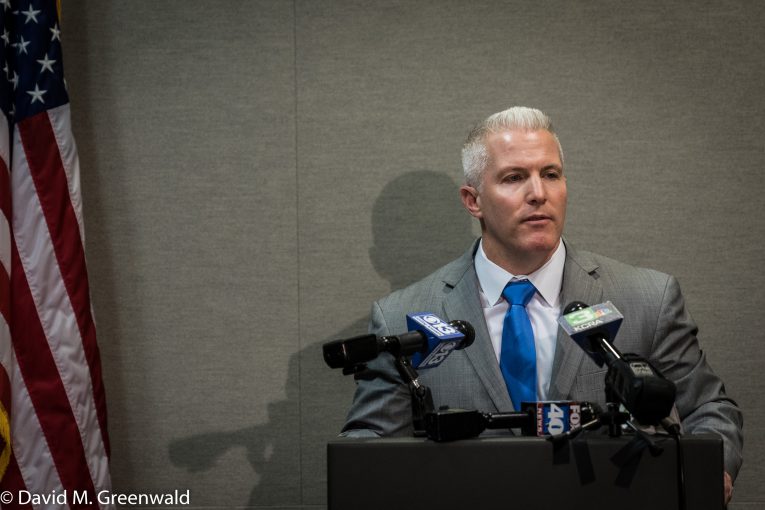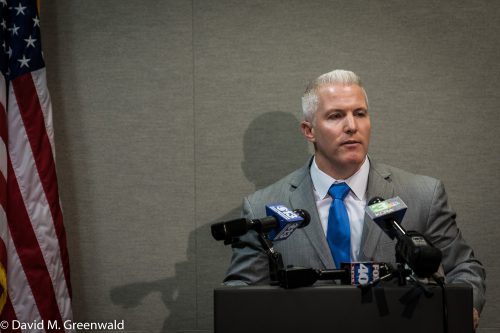

The recent saga with Sacramento Sheriff Scott Jones and the inability of the Sacramento Board of Supervisors to reign him in is another reminder that perhaps we ought to question the wisdom of electing our sheriffs. Scott Jones won a third term as Sheriff last year, but faced a challenge from Sacramento County inspector general Rick Braziel not electorally but rather in the investigation of an officer involved shooting.
He ended up freezing the former Sacramento Police Chief out of his office. In early December, he defended the lock out saying that while he supports the idea of oversight, he warned the board members not to go too far in trying to provide oversight of an independently elected official.
“An elected official should be free to do the people’s business without outside, undue influence,” Sheriff Jones told the board.
At that meeting, according to news coverage by the Bee, the board would push back, voting unanimously “to move ahead with a scope of services amendment to the Inspector General contract proposed by Supervisor Patrick Kennedy.”
The amendment language modifies the power of the Inspector General to “monitor” critical incidents and “make independent recommendations” in significant use-of-force cases, including officer-involved shootings and in-custody deaths. The Inspector General may also independently conduct investigations at the request of the Board of Supervisors, according to meeting documents.
Supervisors also “passed a motion to draft a memorandum of understanding with the sheriff that would allow any future Inspector General to have unfettered access to officer-involved shooting  scenes.”
scenes.”
What is obvious is that this is going to set up a constitutional fight – not now but down the line.
In another pointed editorial from the Sacramento Bee Editorial Board, they likened recent reporting on Scott Jones’ use of power to that of Bull Connor, the infamous Birmingham public safety commissioners from the 1960s noted for turning dogs and firehoses on civil rights protesters.
Of course, Bull Connor’s tactics probably turned the tide on public opinion regarding the civil rights movement – it is hard to know how Scott Jones’ actions will play out.
Wrote the Bee, “People like Jones should be leading the way toward solutions. Instead Jones has fought to hide the truth, evade accountability, bully critics and muzzle those charged with holding him accountable. He proudly resists progress.”
The Bee called on the County Supervisors to “summon the courage to stand up and step in.”
They called on the board to pass “an ordinance to make the inspector general a permanent county office, rather than merely a contract job, and grant it independent power to conduct investigations of the sheriff’s department and report findings directly to the board. Under the current system, the inspector general can be bullied and influenced by the very person he’s charged with overseeing and fired at any time.”
But the Bee went further, “It’s also time for California to consider a broader question about whether sheriffs should be appointed rather than elected. The idea of the elected sheriff dates back to the 1600s. A lot has changed since then. Law enforcement is too important to leave in the hands of people like Jones who think their job is to play politician rather than serve the ideals of safety and justice.
“Changing the state constitution wouldn’t be easy, but even the people of Birmingham rose up and converted Bull Connor’s elected commissioner position into an appointed one. He ran for mayor, lost and faded into history.”
While they are at it, perhaps the legislature can also look into whether District Attorney’s should remain an elected position rather than be appointed.
For years across the country, winning your first DA’s election was almost like a lifetime appointment. More than 85 percent of DA’s were not challenged, and the vast majority of those who were  challenged won re-election anyway.
challenged won re-election anyway.
Over the more than 2400 elected prosecutors in America, 95 percent are white and less than one percent are women of color.
But there are shifts in those trends with a record breaking number of people of color and woman expected to run in 2018.
Change did happen – albeit slowly. In Texas for instance, 7 of the 13 prosecutors who were challenged in primaries lost.
In California there was a wave of DA challengers – but many of them lost. In Sacramento County, Anne Marie Schubert beat back Noah Phillips fairly easily despite the highly charged election. In Alameda, District Attorney Nancy O’Malley won a third term, defeating challenger Pamela Price, a progressive civil rights attorney.
In Riverside, Incumbent DA Mike Hestrin defeated reform-minded defense attorney Lara Gressley. In San Diego, Republican District Attorney Summer Stephan defeated her Democratic challenger, public defender Geneviéve Jones-Wright, one of the most progressive candidates running this cycle.
The exceptions, in San Bernardino, Republican District Attorney Summer Stephan defeated her Democratic challenger, public defender Geneviéve Jones-Wright, one of the most progressive candidates running this cycle. Mr. Ramos was a hardliner and Mr. Anderson was a moderate, but pledged some reforms.
In Contra Costa County, progressive reformer Diana Becton, a retired judge and current interim district attorney won. She is the first woman and first African American to lead Contra Costa County and she was appointed after the previous DA was forced to resign following a felony perjury conviction.
In Orange County, Tony Raukauckas lost in a run off against Supervisor and former Republican Assemblymember Todd Spitzer.
And in Yolo County, three term DA Jeff Reisig won a surprisingly narrow fourth term over Public Defender Dean Johansson.
Yolo County illustrates the nature of the challenge and questions about whether an elected DA is the way to go.
In 1984, David Henderson defeated former Davis Mayor and County Supervisor Bob Black. He never faced election again. In 2006, Jeff Reisig defeated Pat Lenzi to become DA. He was not challenged in 2010 or 2014. So in 34 years, there were three contested elections in Yolo County.
Having an appointed process would not necessarily insure that results would change. After all, of the five board of Supervisors in place in June, four of them endorsed the incumbent. Only Don Saylor supported the challenger.
On the other hand, just as is the case with Scott Jones, there are two incidents from the past election that really illustrate the need to re-examine whether DA’s are elected.
The first incident occurred during the election itself. Third party groups launched an attack on the challenger, citing a police report from about ten years ago involving the family of Dean Johansson and complaints that he may have assaulted his son. Of issue here is how those third parties obtained what would have been confidential police reports unless they were leaked by the DA’s office. No one has investigated the incident to determine how those police reports were released.
More recently, there is the prosecution of Maria Grijalva. The complaint stems from an independent expenditures that she made on behalf of a candidate for Mayor in West Sacramento. But Ms. Grijalva was also a large donor to Mr. Johansson donating more than $20,000 to oppose Mr. Reisig.
Questions that arise are why was this matter handled criminally when the normal protocol is to handle them administratively and assess administrative fines, why did the DA rather than the FPPC take the matter on, and should the DA have recused himself.
Both incidents represent a potential abuse of power on behalf of the DA’s office, neither have to our knowledge been investigated by the Board of Supervisors or other agencies, and both represent a blurring of the line between the official powers of the prosecutor’s office and the political demands of an elected position.
At this point, we are not recommending or advocating shifting to an appointed position, we are only raising the issue in hopes of a broader discussion of whether these offices should be elected or appointed.
—David M. Greenwald reporting

Maybe POTUS should just appoint everybody
Not a federal office.
since your position is to disenfranchise the electorate you might as well aim high.
The President can’t appoint to a state office